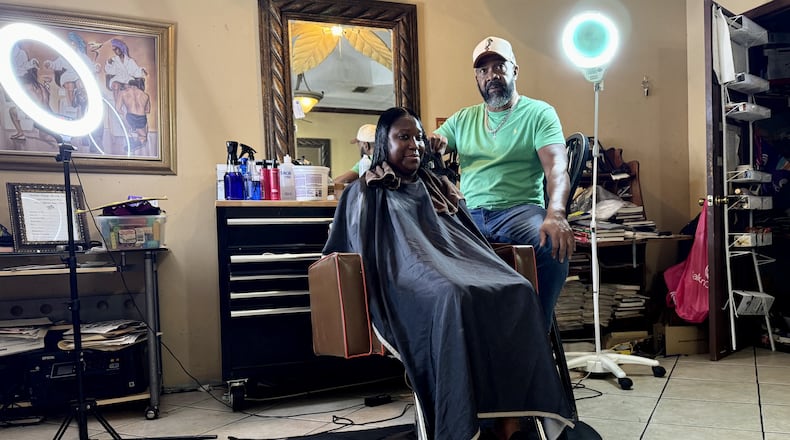FORT VALLEY — At the Hidden Image hair salon, proprietor and stylist Garrett Milton had his hands full.
Milton was juggling three clients — washing one, coloring another, keeping watch on the third perched beneath a dryer.
On television the night before, Vice President Kamala Harris had received rousing endorsements for her presidential candidacy at the Democratic National Convention in Chicago, including key support from former first couple Barack and Michelle Obama.
At the salon, just down from the courthouse where once a year locals gather to make what is hailed as the world’s largest peach cobbler, Milton and his patrons were weighing in on the chances that a woman of Black and Asian heritage would be elected as the leader of the free world.
Milton, 66, who is Black and grew up in beauty parlors run by his grandmother and mother, said: “I think she’s going to win. You’re getting a Black female running for a Democratic presidency. … I think Black women are going to stand up and fight” for her.
Black voters have traditionally backed the Democratic ticket in large numbers, and support increased even more after President Joe Biden stepped aside. A recent USA Today/Suffolk University poll showed the party’s lead among Black voters surged from favoring Biden over former President Donald Trump by 47 percentage points to a 64-point spread for Harris.
Charlia Williams, an 86-year-old former elementary school teacher and one of Milton’s customers at the salon, said it’s important that Harris be inclusive.
“To help the country, you have to be concerned about everybody. Not just Republicans, Democrats or independents,” said Williams, who is Black. “Be concerned about people. We talk about the issues people are concerned about: abortion, the border, the economy. Be concerned about that and have their interests at heart.”
Polls show that young voters and Hispanic voters also have thrown their support behind Harris. Still, election observers say heavy turnout among Black voters is crucial to Harris’ success in Georgia.
In Peach County, about 45% of the roughly 29,000 residents are Black. White people account for 51% of the county’s population.
In the 2020 election here, Trump edged Biden by 584 votes. But in Fort Valley, the county seat, where nearly 80% of the 8,800 people are Black, Biden beat Trump by 2,022 votes (3,533 to 1,511).
In 2012, the last time a Black candidate was on the presidential ballot, the margin was far greater for Democrats. Fort Valley voters cast 4,568 votes for Barack Obama. The Republican candidate, Mitt Romney, though far less popular than Trump is now, received 1,335 votes.
Credit: Joe Kovac Jr.
Credit: Joe Kovac Jr.
Milton says that when he looks around Peach County and sees Trump signs in front yards, he assumes white people live there. Milton believes they have bought into Trump’s rhetoric about dangerous immigrants and claims of an America that is falling apart. It’s a campaign that Milton views as being “driven on fear.”
Trump, he said, is “telling them what they want to hear to get them geeked up.”
About then, Williams chimed in.
She says what she can’t grasp is the fervor, the seeming thirst for divisiveness that she feels Trump followers feed on when he blasts Harris and other political foes.
“He’s calling names — ‘she’s dumb,’ ‘she’s garbage,’ ‘lowlife,’ ‘doesn’t know anything,’ ‘I look better than she does’ — and they’re just cheering,” Williams said. “What is wrong with them? I really can’t understand.”
Williams believes in freedom of choice when it comes to reproductive rights and is in favor of LGBTQ rights.
She has lately taken to signing cards and letters with a different farewell phrase. Instead of “sincerely,” she writes, “I love you.”
“It’s important to love everybody,” she said. “But we don’t do that. Trump divides people. We don’t need that. … He separates people. We’re supposed to be concerned about everybody and treat everybody with kindness, love and respect, and have some compassion.”
From across the salon, Milton posed a question, something that perhaps illustrated the country’s polarization when it comes to Trump.
“Mrs. Williams,” he asked, “what do you think when you see a Trump sticker or a sign in somebody’s yard?”
“That they’re ignorant,” she said.
“I’m thinking racism,” Milton replied.
He told of a stretch of road near I-75, up from the county hospital on the south side of neighboring Byron, in a tree-lined neighborhood not far from a truck stop and a strip club.
For half a mile or so, Trump signs sprout from most every yard. Williams, who taught school near there until she retired three decades ago, told of riding through recently.
“I said, ‘Let’s get out of Trump country,’ ” Williams said. “We turned around and left. I’m not joking.”
Credit: Joe Kovac Jr.
Credit: Joe Kovac Jr.
About the Author
Keep Reading
The Latest
Featured







